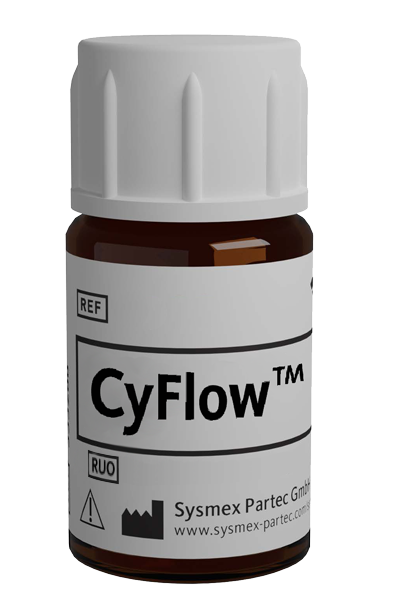CyFlow™ CD3 act. PE

| Antibody: | Yes |
| Antigen: | CD3 (activation epitope) |
| Application: | Flow cytometry |
| Clonality: | monoclonal |
| Clone: | APA1/1 |
| Emission Maximum: | 576 nm |
| Excitation Maximum: | 496 nm, 565 nm |
| Field of Interest: | Immunophenotyping |
| Format/Fluorochrome: | PE |
| Isotype: | IgG1 |
| Laser: | Blue , Green, Yellow |
| Regulatory Status: | RUO |
| Source Species: | Mouse |
| Target Species: | Human, Mouse |
| Product number: | CM152332 |
For Research Use Only
| HLDA Workshop | HLDA III—WS Code T 126 |
| Concentration Unit | mg/mL |
| Concentration | 0,1 |
| Quantity | 0.1 mg |
| Volume | 1.0 mL |
| Immunogen | Purified human CD3 proteins isolated from thymus |
| Background Information | CD3 complex is crucial in transducing antigen-recognition signals into the cytoplasm of T cells and in regulating the cell surface expression of the TCR complex. T cell activation through the antigen receptor (TCR) involves the cytoplasmic tails of the CD3 subunits CD3γ, CD3 δ, CD3ε and CD3ζ. These CD3 subunits are structurally related members of the immunoglobulins superfamily encoded by closely linked genes on human chromosome 11. The CD3 components have long cytoplasmic tails that associate with cytoplasmic signal transduction molecules. This association is mediated at least in part by a double tyrosine-based motif present in a single copy in the CD3 subunits. CD3 may play a role in TCR-induced growth arrest, cell survival and proliferation. |
| Usage | The reagent is designed for Flow Cytometry analysis. Suggested working usage is 5·µg/ml. Indicated dilution is recommended starting point for use of this product, but working concentrations should be validated by the investigator. |
| Storage Buffer | The reagent is provided in stabilizing phosphate buffered saline (PBS) solution, pH ≈7.4, containing 0.09% (w/v) sodium azide. |
| Storage | Avoid prolonged exposure to light. Store in the dark at 2-8°C. Do not freeze. |
| Stability | Do not use after expiration date stamped on vial label. |
| Alarcón B, Ley SC, Sánchez-Madrid F, Blumberg RS, Ju ST, Fresno M, Terhorst C: The CD3‑gamma and CD3‑delta subunits of the T cell antigen receptor can be expressed within distinct functional TCR/CD3 complexes. EMBO J. 1991 Apr; 10(4):903‑12. < PMID: 1826255 > | Delgado P, Fernández E, Dave V, Kappes D, Alarcón B: CD3delta couples T‑cell receptor signalling to ERK activation and thymocyte positive selection. Nature. 2000 Jul 27; 406(6794):426‑30. < PMID: 10935641 > | Torres PS, Alcover A, Zapata DA, Arnaud J, Pacheco A, Martín-Fernández JM, Villasevil EM, Sanal O, Regueiro JR: TCR dynamics in human mature T lymphocytes lacking CD3 gamma. J Immunol. 2003 Jun 15; 170(12):5947‑55. < PMID: 12794121 > | Gil D, Schrum AG, Alarcón B, Palmer E: T cell receptor engagement by peptide‑MHC ligands induces a conformational change in the CD3 complex of thymocytes. J Exp Med. 2005 Feb 21; 201(4):517‑22. < PMID: 15728235 > | Risueño RM, Gil D, Fernández E, Sánchez-Madrid F, Alarcón B: Ligand‑induced conformational change in the T‑cell receptor associated with productive immune synapses. Blood. 2005 Jul 15; 106(2):601‑8. < PMID: 15790785 > | Rieux-Laucat F, Hivroz C, Lim A, Mateo V, Pellier I, Selz F, Fischer A, Le Deist F: Inherited and somatic CD3zeta mutations in a patient with T‑cell deficiency. N Engl J Med. 2006 May 4; 354(18):1913‑21. < PMID: 16672702 > | Risueño RM, van Santen HM, Alarcón B: A conformational change senses the strength of T cell receptor‑ligand interaction during thymic selection. Proc Natl Acad Sci USA. 2006 Jun 20; 103(25):9625‑30. < PMID: 16766661 > | Wong AP, Dutly AE, Sacher A, Lee H, Hwang DM, Liu M, Keshavjee S, Hu J, Waddell TK: Targeted cell replacement with bone marrow cells for airway epithelial regeneration. Am J Physiol Lung Cell Mol Physiol. 2007 Sep; 293(3):L740‑52. < PMID: 17616650 > | Tailor P, Tsai S, Shameli A, Serra P, Wang J, Robbins S, Nagata M, Szymczak-Workman AL, Vignali DA, Santamaria P: The proline‑rich sequence of CD3epsilon as an amplifier of low‑avidity TCR signaling. J Immunol. 2008 Jul 1; 181(1):243‑55. < PMID: 18566390 >
